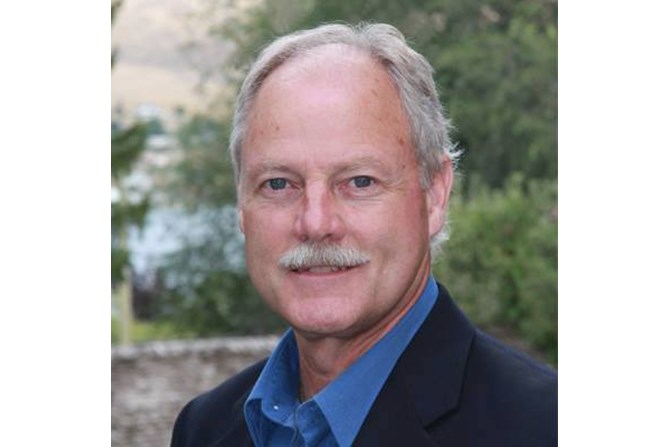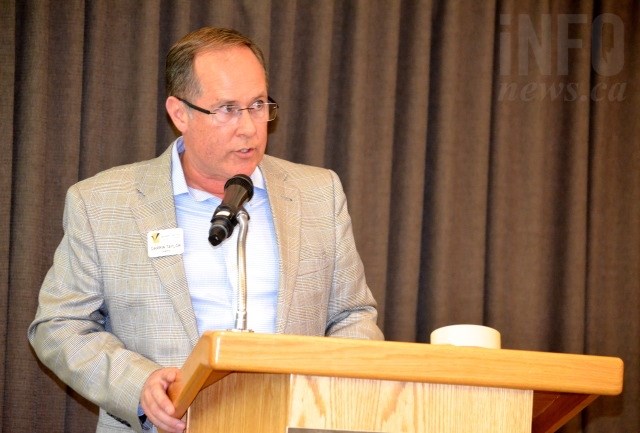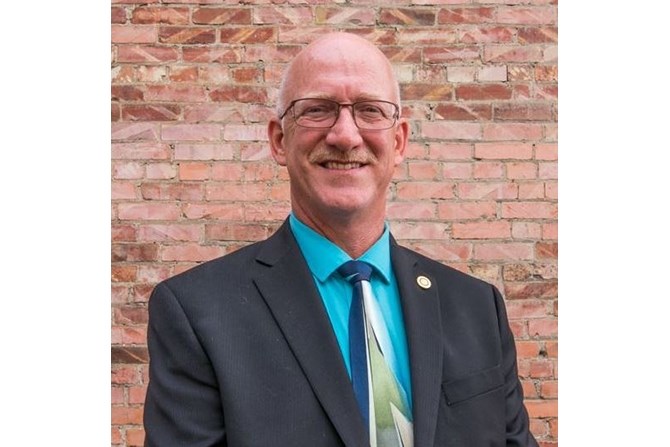
Image Credit: Shutterstock
October 15, 2018 - 6:30 PM
VERNON - Issues with homeless and street crime pushed its way to the top of the agenda in the last few years but there’s two general ways of looking at the issue.
One is to approach the problem by addressing the issues themselves: homeless transition, affordable housing, supports for addicts etc. Another approach starts at the impacts of those issues on residents and businesses and seek to correct or mitigate. Of course, you also could do both.
We asked candidates: How would you approach the growing conflicts between businesses and residents and the street population?
While many candidates mentioned both, we broke it down by their main thrust. Read below for excerpts of their comments. Full responses to the question are at the bottom of the page.
Help at the source of the problem

Victor Cumming
Image Credit: Facebook
Victor Cumming (for mayor): The ultimate solution includes supportive housing, the continuum of services to address addictions, and basic skills training to assist people back into the workforce. Greater Vernon will benefit from continuing to strengthen and enhance the networks of professionals and resources primarily with senior government funds to create long term, lasting solutions. The City is a key player and the Mayor needs to be a leader in the process. Is there a simple solution, NO – just hard work by skilled people with the required financial underpinning.
Kelly Fehr: I will continue to work closely with federal, provincial and municipal bodies to increase our housing stock to combat Vernon’s housing crisis. I will support the cities current direction of ensuring we are open to working closely with stakeholders to fast track affordable housing opportunities. This will reduce squatting, loitering and defecation on private property.
Rick Lavin: There is good work already being done in Vernon through the efforts of Partners-In-Action and the Social Planning Council. Vernon is seen as a best practice around the province and around the world because we involve stakeholders in finding solutions. I would work to support the work already being done, make it easier for housing units to be built, ensure social programs are supported and ensure the citizens’ and businesses’ interests are considered. Strong boundaries are necessary but there also needs to be options available for desired behavior to happen.
Dawn Tucker: I have found that the Us versus Them approach isn’t going to curtail these conflicts. We are one community. I believe in working together towards progressive solutions; lets get stakeholders to buy into easing these conflicts by meeting each other part way.
Help mitigate impacts
Teresa Durning: In an ideal world the reduction in street-entrenched citizens, with treatment and housing initiatives would likely reduce the issue. I do believe a healthy business sector is essential to our community but again there is no law against much of what is going on. With no broken laws there can be no enforcement. It is imperative we work hard to create a climate of resolve to keep our business community downtown.
Jasmine Finlay: We need more support for businesses in dealing with the impacts of the street entrenched population. A municipality should be helping businesses thrive, not fining frustrated business owners who are at the end of their rope.
We can’t have this conversation under the umbrella of “either/or”. I strongly believe we can work to secure the resources to help the people that want our help, while simultaneously acknowledging that a tiny percentage of our population is causing the vast majority of the negative impacts.
Sherrilee Franks: I would approach the growing conflicts by implementing additional recommendations from the Safety Task Force Final Report which the current council are in the process doing. I would continue to support this.
Kari Gares: In our compassion and sympathy for those suffering, we tend to ignore those who are being severely impacted by our lack of inaction. For most, they are asking for the City to step up and control a problem that is seemingly spiralling out of control. When businesses must continuously pick up refuse and human waste from a small portion of the street entrenched who don’t seem to care, we, inadvertently, create a divide. There is a real sense of fear that if we do something that seems uncompassionate we will be labeled.
Jamie Morrow: The City fund, on an annual basis, private security for an afterhours patrol (if the recommendations above do not stop the growing conflicts between businesses and residents and the street population) I believe that these will start to build the framework to significantly curb the growing conflicts between businesses and residents and the street population and will create a safer and more secure downtown starting now.
Dalvir Nahal: After the recommendations were made from the task force, we have started to see some positive changes. Council has increased our Bylaw and RCMP budgets to allow for more boots on the ground... We need to ensure that our social agencies continue to educate and have conversations with the street population about the effects their actions are having as a community as a whole. Our new weekly cleanup program will also help ease some of the concerns that are caused by the mess being left behind by the street entrenched.

Darrin Taylor speaks at a town hall meeting hosted by the Activate Safety Task ForceApril 5, 2018.
(CHARLOTTE HELSTON - REPORTER / iNFOnews.ca)
Darrin Taylor (for Mayor): As a downtown business owner, I believe that things have begun to improve. People in Vernon are compassionate and, in my experience, want to help their neighbour. There is, however, a growing intolerance toward criminal activity. That is why any plan to tackle poverty, homelessness, and addiction must be supported by enforcement initiatives. Then the city, service providers, non-profit agencies, Interior Health, and BC Housing can do the work that they do best.
Don Jefcoat: Much of the conflict is due to certain behaviours being allowed to take place. If a street entrenched person can dump garbage on private property with no consequence they will continue to do so. If they are permitted to use illegal drugs they will do so even leaving their dirty needles behind. We need to ensure that we are intervening when laws are breached.
A bit of both
Kevin Lepp: We need to put into action the recommendations of the Activity Safety Task Force. We need to enforce the law and properly support Bylaw and the RCMP as they do their work... A multifaceted approach is required to lobby the provincial government to further address issues such as appropriate mental health beds, addiction/rehab beds and housing for low income and homeless.
Gordon Leighton: For starters, implement the Task Force recommendations that are doable. Contribute to the solution of finding shelter or homes. Collaborate with the social agencies. Focus on RCMP and Bylaw foot and bike patrols in the most affected areas. Maintain positive interactions with all concerned. Invest in frequent and regular sidewalk and alley washing.
Shawn Lee: I believe that any approach to resolve the growing conflicts must involve measured enforcement of the existing laws and compassion for all residents of Vernon involved.
Terry Vulcano: I propose four steps to addressing this issue: (see below)
That’s different

Dave Deshane
Image Credit: Facebook
Dave Deshane: More shelters are not the answer as most shelter beds are empty now. Shelter beds come with rules and some semblance of sobriety. So the ‘homeless’ choose to stay on the street.
Sam Zaharia: I would break it to them gently that prior Councils have sold a bill of goods that must not be delivered. This mountain isn't moving. We're going to have to honour the lay of the land.
These six candidates did not respond:
Scott Anderson
Art Gourley
Lily Kerr
Akbal Mund
Erik Olesen
Brian Quiring
Full responses
Victor Cumming: The ultimate solution includes supportive housing, the continuum of services to address addictions, and basic skills training to assist people back into the workforce. Greater Vernon will benefit from continuing to strengthen and enhance the networks of professionals and resources primarily with senior government funds to create long term, lasting solutions. The City is a key player and the Mayor needs to be a leader in the process. Is there a simple solution, NO – just hard work by skilled people with the required financial underpinning. All frontline emergency personnel would prefer if the homelessness and opioid crisis did not exit. It does and Vernon is not isolated from it. Bylaw and the RCMP will continue to encourage people to use the shelters, the new housing units and stay within the law.
Constant systematic interaction between City Council and staff, business owners, Downtown Vernon Association and service providers is required, with the consistent objective of adjusting activities to improve effectiveness.
These major problems did not arise overnight and they will only be solved through concerted efforts and investments by all levels of government and community partners… NO EASY ANSWERS, and continued compassion is the place to start.
Dave Deshane: If there was a magic wand…. Someone would have waved it by now. We will take steps. Some will work, some won’t, it will take effort from all walks of life, including the ‘homeless’. More shelters are not the answer as most shelter beds are empty now. Shelter beds come with rules and some semblance of sobriety. So the ‘homeless’ choose to stay on the street.
The best that our social agencies could do was say that 63% of ‘the homeless’ had some sort of connection to Vernon. I think the real number is much lower and those with truly local connections need to be helped first. I was talking to a ‘homeless’ guy that had a phone and a facebook page, he was from Williams Lake. Then go home.
We also have to remember that some perceived homeless are not. They may have mental health issues and some have local completely loving families. Like I said no Magic solutions.
Teresa Durning: There is no easy answer to this. In an ideal world the reduction in street-entrenched citizens, with treatment and housing initiatives would likely reduce the issue. I do believe a healthy business sector is essential to our community but again there is no law against much of what is going on. With no broken laws there can be no enforcement. It is imperative we work hard to create a climate of resolve to keep our business community downtown. I will be highly motivated to hear from the businesses and get to the root of the problem as stated above in Question #3. [Homelessness and drug issues including discarded needles have become a major issue in Vernon over the last four years. Does the city of Vernon share for how this situation has developed? If so, what could it have done better?]
Kelly Fehr: The term street population is a very broad term which could include every homeless individual, low- and middle-income individuals involved in crime /drug selling trade whether housed or not, individuals involved in survival sex, individuals deeply entrenched in chronic substance misuse and youth who do not have an adequate support system.
Homeless individuals: I will continue to work closely with federal, provincial and municipal bodies to increase our housing stock to combat Vernon’s housing crisis. I will support the cities current direction of ensuring we are open to working closely with stakeholders to fast track affordable housing opportunities. This will reduce squatting, loitering and defecation on private property. For further detail refer to the question - What can council do to make housing more affordable?
Low- and middle-income individuals involved in crime /drug selling trade whether housed or not: I would vote against a freeze on RCMP or Protective Services funding. I would support the Union of B.C. Municipalities recently proposed short-term strategy regarding the federal legalization of the cannabis industry. As we see the black-market cannabis industry reduce (not disappear) we may be able to invest the tax revenue into health services and crime reduction strategies.
Individuals involved in survival sex: City council plays a limited role in supporting individuals entrenched in street level survival sex. Funding for status of women programming was cut by the federal Conservative government years ago and supports diminished. In 2016 the federal Liberal government changed the status of women mandate to allow for more assistance. I will continue to provide support to the agencies that work with this vulnerable population and advocate with stakeholders to the federal government to reinvest in Vernon.
Individuals deeply entrenched in chronic substance misuse: I will continue to talk with Interior Health and advocate for additional substance use supports. I have played a role in bringing new recovery supports and health authority funding to Vernon in the last year. This will continue to be a focus of mine.
Youth who do not have an adequate support system: I would support early childhood education and subsidized daycare initiatives. It is a long-term approach, however low- and middle-income families will continue to benefit from supports for their children.
Jasmine Finlay: Again, many municipalities are facing the same issues, and we need to be real about the fact there are no easy answers. Especially when local governments have so little control over how services are delivered by other levels of government. That said, the situation is clearly out of balance. We need more support for businesses in dealing with the impacts of the street entrenched population. A municipality should be helping businesses thrive, not fining frustrated business owners who are at the end of their rope.
We can’t have this conversation under the umbrella of “either/or”. I strongly believe we can work to secure the resources to help the people that want our help, while simultaneously acknowledging that a tiny percentage of our population is causing the vast majority of the negative impacts.
Sherrilee Franks: I would approach the growing conflicts by implementing additional recommendations from the Safety Task Force Final Report which the current council are in the process doing. I would continue to support this.
Kari Gares: As mentioned previously, conflicts arise when people feel they are not being heard. They are further exasperated when businesses and citizens see little to no activity to remedy the problem, or that their concern is viewed as less than when compared to those who have so little. This is the problem. In our compassion and sympathy for those suffering, we tend to ignore those who are being severely impacted by our lack of inaction. For most, they are asking for the City to step up and control a problem that is seemingly spiralling out of control. When businesses must continuously pick up refuse and human waste from a small portion of the street entrenched who don’t seem to care, we, inadvertently, create a divide. There is a real sense of fear that if we do something that seems uncompassionate we will be labeled. This is where the City can take charge to control the problem. It shouldn’t fall onto the backs of our local businesses to fix. It needs to be a group effort spearheaded by our local Government and Provincial Agencies.
Don Jefcoat: Much of the conflict is due to certain behaviours being allowed to take place. If a street entrenched person can dump garbage on private property with no consequence they will continue to do so. If they are permitted to use illegal drugs they will do so even leaving their dirty needles behind. We need to ensure that we are intervening when laws are breached. We can do this with some decorum. We don't need to allow bad behaviour under the guise of compassion. We also don't need to be heavy handed. If one is caught with a stolen shopping cart we can recommend they go to a place and get a wagon, or find storage first.
Rick Lavin: There is good work already being done in Vernon through the efforts of Partners-In-Action and the Social Planning Council. Vernon is seen as a best practice around the province and around the world because we involve stakeholders in finding solutions. I would work to support the work already being done, make it easier for housing units to be built, ensure social programs are supported and ensure the citizens’ and businesses’ interests are considered. Strong boundaries are necessary but there also needs to be options available for desired behavior to happen.
Shawn Lee: I believe that any approach to resolve the growing conflicts must involve measured enforcement of the existing laws and compassion for all residents of Vernon involved. Such an approach will be effective to the degree to which an in depth understanding of the problem is used as a basis to suggest solutions. Such understanding can only come from a free and frank discussion with representation from all the interested parties: a discussion free of bias and accusations.
Gordon Leighton: For starters, implement the Task Force recommendations that are doable. Contribute to the solution of finding shelter or homes. Collaborate with the social agencies. Focus on RCMP and Bylaw foot and bike patrols in the most affected areas. Maintain positive interactions with all concerned. Invest in frequent and regular sidewalk and alley washing.
Above all, let us not be bullies or vigilantes. The RCMP must be tough on criminal acts. Allow the justice system to deal with crime. Give people a hand up, not a kick when they are down.
Kevin Lepp: We need to put into action the recommendations of the Activity Safety Task Force. We need to enforce the law and properly support Bylaw and the RCMP as they do their work. While we need to maintain a compassionate approach to the homeless we also need to support our local business owners and residents who have valid regarding how this issue is affecting the community. We need to take serious the concerns of the whole community. A multifaceted approach is required to lobby the provincial government to further address issues such as appropriate mental health beds, addiction/rehab beds and housing for low income and homeless.
Jamie Morrow: I agree and support these recommendations from the Activate Safety Task Force proposals.
RCMP
a) Council request the expansion of an RCMP Downtown Enforcement Unit, including ongoing foot and bike patrols.
Bylaw
a) Council support two new full time equivalent Bylaw hires dedicated to seasonal foot/bike patrols in trouble spots identified by Bylaw/RCMP.
b) Council support an earlier daily start for proactive seasonal Bylaw officers (e.g. 7 a.m.). This will allow Bylaw to attend RCMP Watches (briefings) in the morning prior to street duty at 7:30 a.m. and help coordinate the two.
c) Council support an earlier annual start for seasonal Bylaw officers (e.g. March- October).
d) Council support a proactive (instead of complaint-initiated) approach by Bylaw to issues related to drug use, graffiti, litter, prostitution, panhandling.
e) Council support a tough interpretation and proactive enforcement of existing bylaws related to drug use, graffiti, litter, prostitution, panhandling.
The City fund, on an annual basis, private security for an afterhours patrol (if the recommendations above do not stop the growing conflicts between businesses and residents and the street population)
I believe that these will start to build the framework to significantly curb the growing conflicts between businesses and residents and the street population and will create a safer and more secure downtown starting now.
Dalvir Nahal: After the recommendations were made from the task force, we have started to see some positive changes. Council has increased our Bylaw and RCMP budgets to allow for more boots on the ground. This will assist in addressing concerns in the downtown by providing a visible police and bylaw presence. These officers need to continue to develop a relationship within the community and work with our community partners to help reduce crime, have open and continued dialogue with our downtown business to ensure their concerns are heard and addressed. We need to ensure that our social agencies continue to educate and have conversations with the street population about the effects their actions are having as a community as a whole. Our new weekly cleanup program will also help ease some of the concerns that are caused by the mess being left behind by the street entrenched.
Darrin Taylor: I have spoken at length to this question in my responses to 2,3 and 4. As a downtown business owner, I believe that things have begun to improve. People in Vernon are compassionate and, in my experience, want to help their neighbour. There is, however, a growing intolerance toward criminal activity. That is why any plan to tackle poverty, homelessness, and addiction must be supported by enforcement initiatives. Then the city, service providers, non-profit agencies, Interior Health, and BC Housing can do the work that they do best.
Dawn Tucker: I live downtown and I often walk downtown multiple times a day. I have experienced many of the same issues others have complained about. I have picked up needles and I’ve cleaned up abandoned homeless camps, garbage strewn around businesses, abandoned carts garbage including feces. I’ve photographed and reported drug dealers, I have had to kick people doing drugs out of my property and I’ve had belongings stolen from me as well as recyclables. On the other side I’ve also hired those who are homeless, given out food and helped people who are homeless obtain ID or services. In the end I have found that the Us versus Them approach isn’t going to curtail these conflicts. We are one community. I believe in working together towards progressive solutions; lets get stakeholders to buy into easing these conflicts by meeting each other part way. We can work on education of mitigation methods and perhaps offer city support such as partnering with a nonprofit and businesses to offer subsidized locks for bikes, motion sensor lights and put in bike lockers in various locations just as some examples and once again we need to offer avenues for the public to express concerns or ideas in a more accessible way.
Terry Vulcano: I propose four steps to addressing this issue:
a) facilitating workshop-like-sessions with the stakeholders (public & businesses, including employees) that involves the street dwellers, to discuss the concerns and reach agreeable solutions;
b) working with other communities to share approaches and solutions (in September I visited Medicine Hat to learn about their successes);
c) have measurable objectives to assess the success of any programs or decisions implemented;
d) turn over parking meter money to the downtown business association (in an accountable way) for them to take security measures, hold events and promote Vernon. This in turn may alleviate the demands on the Police to attend to minor issues.
Sam Zaharia: I would break it to them gently that prior Councils have sold a bill of goods that must not be delivered. This mountain isn't moving. We're going to have to honour the lay of the land.
Have your say in the comments section below.
To contact a reporter for this story, email Shelby Thevenot or call (250) 819-6089 or email the editor You can also submit photos, videos or news tips to the newsroom and be entered to win a monthly prize draw.
We welcome your comments and opinions on our stories but play nice. We won’t censor or delete comments unless they contain off-topic statements or links, unnecessary vulgarity, false facts, spam or obviously fake profiles. If you have any concerns about what you see in comments, email the editor in the link above.
News from © iNFOnews, 2018